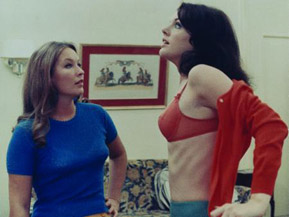Sole Criterion: 2 or 3 Things I Know About Her
By Brett Ballard-Beach
December 20, 2012
All this goes as preface for the fact that 2 or 3 Things I Know About Her is one of the, if not the favorite of the 25% of his work I have seen. It is also on the short list of my favorite films of all time. And partly, this is because, as the title might suggest, there is an aura of uncertainty in the very foundation of the celluloid. Godard provides the narration for the film (more on that in a minute) and there are rants and digressions and philosophies and critiques, but as the narrator notes at the very end, it’s a “zero-sum game” and the nature of a capitalist society drains our brains and places us back at the very start. It is also because, and here I make allowances for my own inability to read the film, I think it fails at the level of its thesis statement, but succeeds magnificently as a document of its time and place, and Godard’s headspace at that moment.
As his jumping off point, Godard used a magazine piece from 1966 (and a letter from a reader inspired by the same) that reported that an astonishing number of women from the newly designed high rises in the outer suburbs of Paris were taking up occasional or frequent prostitution - some on their weekly trips into Paris - in order to make enough money for themselves and their families to do more than just get by. (Some were single mothers, some had husbands whose salaries weren’t enough, and in the case of the aforementioned reader whose impassioned and convincing letter is reprinted in the Criterion Booklet, some were white-collar workers who were passed over for promotions given to male colleagues, and paid significantly less than their counterparts to boot.)
Godard’s film is more concerned with the concept of prostitution in general and rather than translating such an article into something lurid and breathlessly reporting it in efforts to shake an audience, he seems resigned to it, and puts it into the context of modern life in Paris in the fall of 1966. The “narrative” as it stands considers one woman, a wife and mother of two, over the course of about 24 hours, as she goes about a daily (or perhaps weekly) routine of seeing her husband out the door, dropping her two kids off at a child care (that humorously also seems to double as a brothel) and going into Paris for shopping, visiting friends, and turning a few tricks. Her husband, an auto mechanic who dabbles in shortwave radio and consumption of all kinds of literature, remains oblivious. Godard subtly toys with the idea of time through numerous interruptions (as a narrator) and by allowing numerous other incidental characters to break the fourth wall, speaking to their own experience.
I learned in my high school English classes, particularly in regards to our study of poetry, that a reader (or in this case, viewer) should never make the mistake of doing a simple 1:1 equation in which the narrator “I” is to be taken as the author of said piece. It’s an easy thing to want to do. Here, Godard provides the voice of the narrator, and his comments (heavy in the first half, more sparse in the second half of the 87 minute running time) all seem like things like Godard would say or indeed did say, but to say “Jean-Luc Godard” is the narrator is reductive and false.
The narrator speaks in a half-whispered, half-shouted rasp that threatens to fold in on itself. (The effect is at some times akin to someone sharing secrets, and other times akin to the stranger in the van attempting to lure children away with promises of candy.) He knows a lot about the time and the place of the film and isn’t afraid to place his philosophical musings on the soundtrack at great length, but what he stresses up front is the artifice of the whole affair. He introduces us to the lead actress Marina Vlady. He introduces us to the character she will play, Juliette Janson. He notes the color of her/her outfit and expresses inconclusiveness about the color of her/her hair. Later on, he acts quite authorial in a wonderful digression in which he considers that the frame could just as easily have focused on the trees blowing in the wind instead of Juliette driving her car into the station where her husband works (and then illustrates that there were numerous alternate ways she could have been shown pulling into the station.)
Continued:
1
2
3
4
|
|
|
|




